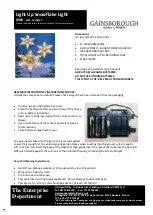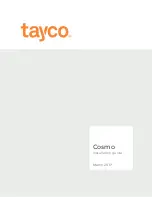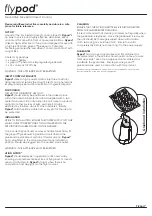
11
5.0 INSPECTION
5.1 INSPECTION FREQUENCY:
The Anchorage Connector
must be inspected at the intervals defined in Section 1
.
Inspection procedures are described in the
“Inspection & Maintenance Log” (Table 2)
.
;
Extreme working conditions (harsh environments, prolonged use, etc.) may require increasing the frequency of
inspections.
5.2 UNSAFE OR DEFECTIVE CONDITIONS:
If inspection reveals an unsafe or defective condition, remove the
Anchorage Connector from service immediately and destroy to prevent inadvertent use. Slings are not repairable.
5.3 PRODUCT LIFE:
The functional life of 3M Anchorage Connectors is determined by work conditions and maintenance.
Maximum lifespan can range from 1 year for heavy use in extreme conditions to 10 years for light use in mild
conditions. As long as the product passes inspection criteria, it may remain in service up to a maximum of 10 years.
6.0 MAINTENANCE, SERVICE, and STORAGE
;
Do not clean and disinfect the
Anchorage Connectors
by any method other than described in the following
“Cleaning Instructions”. Other methods may have adverse effects on the
Anchorage Connectors
or user.
6.1 CLEANING:
Cleaning procedures for Anchorage Connector are as follows:
• Periodically clean the exterior of the Anchorage Connector using water and a mild soap solution. Water
temperature must not exceed 40 °C (104 °F). Position the Anchorage Connector so excess water can drain out.
Do not dry-clean. Do not iron. Clean labels as required.
•
Clean the Anchorage Connector with water and mild soap solution. Rinse and thoroughly air dry. Do not force dry
with heat.
;
Use a bleach-free detergent when cleaning the
Anchorage Connectors
. Fabric softener or dryer sheets
SHOULD NOT be used when cleaning and drying the
Anchorage Connectors
6.2 SERVICE:
Anchorage Connectors are not repairable. If the Anchorage Connector has been subjected to any damage
or fall force, or inspection reveals an unsafe or defective condition, remove the Anchorage Connector from service and
discard.
6.3 STORAGE/TRANSPORT:
Store and transport Anchorage Connectors in a cool, dry, clean environment out of direct
sunlight. Avoid areas where chemical vapors may exist. Thoroughly inspect the Anchorage Connector after any period
of extended storage.
7.0 LABELS
Figure 12 illustrates labels on the the Anchorage Connectors. All labels must be present on the Anchorage Connector.
Information on each label is as follows:
Figure 12 Reference: Description:
1
Model number
2
Serial number
3
Batch number
4
Address of the Manufacturer
5
Read these instructions before use
6
European standard
7
CE Marking of European Conformity
8
Number of Notified body carrying out Conformity to type
9
Length
10
Month of manufacture
11
Year of manufacture
12
Web Address of the Manufacturer
13
Capacity












































